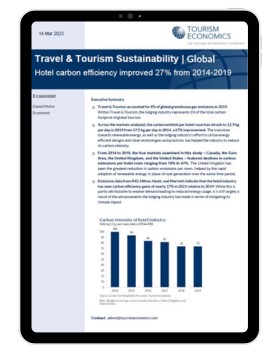Research Briefing
| Mar 14, 2023
Hotel carbon efficiency improved 27% from 2014-2019

Travel & Tourism accounted for 8% of global greenhouse gas emissions in 2019. Within Travel & Tourism, the lodging industry represents 6% of the total carbon footprint of global tourism.
What you will learn:
- Across the markets analyzed, the carbon emitted per hotel room has shrunk to 12.9 kg per day in 2019 from 17.5 kg per day in 2014, a 27% improvement. The transition towards renewable energy, as well as the lodging industry’s effort to utilize energy efficient designs and clean technologies and practices, has helped the industry to reduce its carbon intensity.
- From 2014 to 2019, the four markets examined in this study – Canada, the Euro Area, the United Kingdom, and the United States – featured declines in carbon emissions per hotel room ranging from 16% to 47%. The United Kingdom has seen the greatest reduction in carbon emissions per room, helped by the rapid adoption of renewable energy in place of coal generation over the same time period.
- Emissions data from IHG, Hilton, Hyatt, and Marriott indicate that the hotel industry has seen carbon efficiency gains of nearly 17% in 2021 relative to 2019. While this is partly attributable to weaker demand leading to reduced energy usage, it is still largely a result of the advancements the lodging industry has made in terms of mitigating its climate impact.
Tags:
Related Services

Service
Tourism Forecasts and Scenarios
Track, analyse, and react to macro events and future trends for the European region.
Find Out More
Service
Global Travel Service
Detailed travel and tourism market trends and forecasts for 185 countries globally.
Find Out More
Service
International State Travel
Travel data covering international visits and nights by source country to the 50 states of the USA.
Find Out More